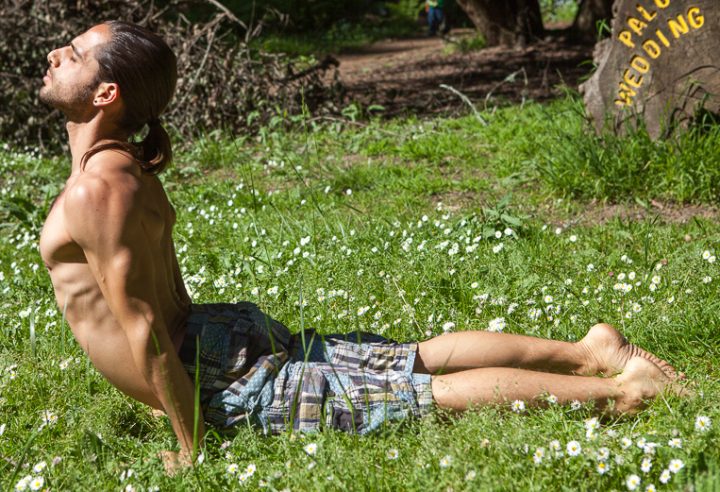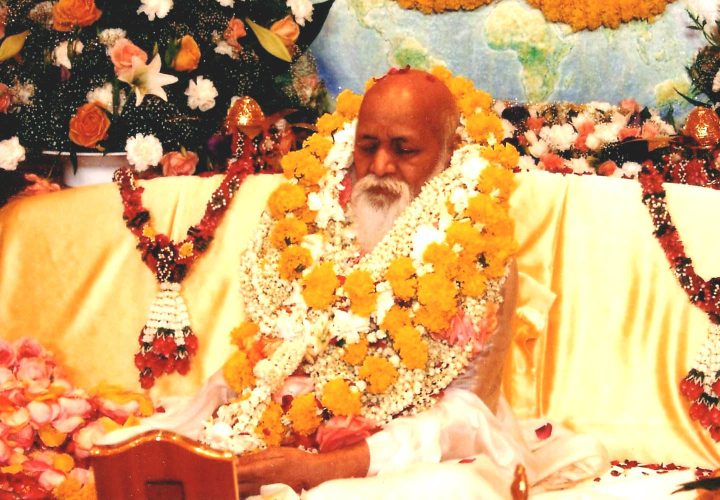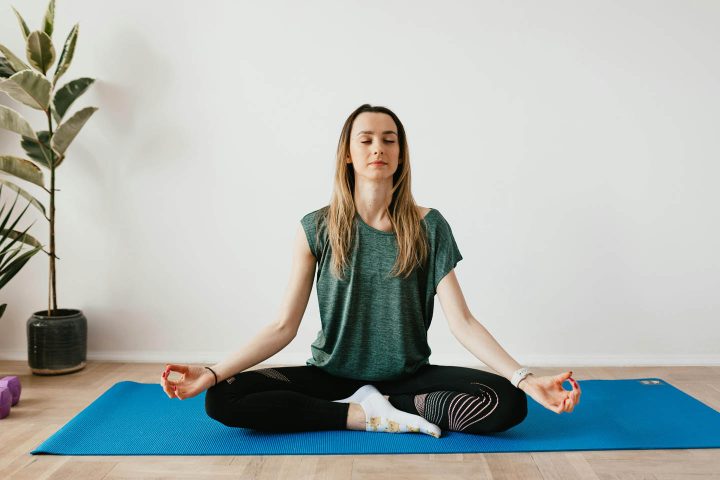There is hardly any book or program that teaches stress management and does not mention anything about Yoga and some form of Eastern Meditation. Yoga is praised for its relaxing properties and sought for stress relief, as well as touted for its benefits of improved flexibility, better mood and heightened mind-body awareness. There are thousands of yoga teachers all around the world, teaching all forms of nuances and styles of yoga, and even big corporations are offering yoga classes in order to provide stress relieving techniques for their employees.

What can yoga really do for you and is it efficient to control your stress? Before you jump onto the Yoga bandwagon, let me take you onto a journey to discover the roots of Yoga and understand what the deeper meaning behind those techniques really is.
Roots of Yoga
Yoga is first mentioned in Hindu texts around 4 centuries before Christ. It is probably derived from the hindi word yui, which means to joke, probably in the sense of yoking or controlling the body and ultimately the mind in order to reach the highest state of consciousness.1)Wikipedia: https://en.wikipedia.org/wiki/Yoga
The ultimate goal of Yoga is to achieve moshka, also called mukti, which is supposed to be the liberation from the cycle of reincarnation. Through various practices like postures, breathing exercises, and meditation, the yoga practitioner aims to purify the mind and body, ultimately realizing the oneness with Brahman, which is the universal divine principle. Hinduism knows a multitude of different Gods, but ultimately believes in a divine energy that permeates all living beings, very similar to Pantheism, and quite contrary to the Christian believe of a personal God that has a personal interest in humanity.
Chacras are very important in Hinduism and are considered energy points along the spine, which help our body to communicate with this divine energy. Yoga postures, also called asanas, specific breathing exercises and meditation are supposed to balance the energy flow, and so giving health and energy to the body.
A special role has the third eye chacra, located in the center of the forehead between the eyebrows. It is supposed to be the bridge between the physical world and the realm of intuition or spiritual understanding, and reaching this higher state of consciousness is considered to be the ultimate goal of all forms of Yoga practices.
Serpents also have an important function in Hinduistic mythology. They are supposed to be the bed of the god Vishnu, and Shiva is depicted with a snake around his neck. Serpents are also considered to be the guardians of the underworld. Yoga is using the Cobra pose and other asanas that resemble the movements of a snake.

Interestingly, in Kundalini Yoga a powerful spiritual energy is believed to be dormant at the base of the spine. When it is awakened by specific Yoga rituals, it travels up the different chakra points at the spine until it reaches the third eye chakra. This kundalini energy is also depicted as a snake, which in Christianity represents Luzifer, who deceived Eve in Eden with the claim to receive a higher state of consciousness. Obviously Hinduism and Christianity do not mix very well.2)Documentary: Yoga Uncoiled. Jeremiah Films
Move to the West
How come that this Hinduistic practice is now popular all around the world? The Beatles were surely among the most popular defenders of Transcendental Meditation and Yoga, and the countercultural Hippie Movement embraced Yoga and TM for his new forms of enlightenment. The New Age movement is loving it, and by the 1980s the fitness industry got a special interest in Yoga, until it became a mainstream tool for fitness and stress control.
In India those developments are received with mixed feelings. Many practitioners and gurus are going like missionaries to the West to popularize Yoga, meditation and other hinduistic practices and teachings. Many are thrilled about the popularity of Yoga and eastern meditation in Christian countries. Others are worried that western Yoga teachers could misrepresent or dilute the hinduistic heritage of Yoga. They are concerned that many are just practicing the exercises without a proper understanding of the philosophy of Yoga. What they all agree on, is that Hinduism is the very soul of Yoga, which cannot be separated from its roots.
Fitness clubs are offering yoga moves for exercise. Churches are offering Yoga classes with a Christian touch as a form to find a deeper spiritual experience. It really holds center stage in the transformational health movement. But the Indian gurus tell us that Yoga is inherently rooted into hinduistic philosophy. So how should we position ourselves?
Yoga and Transcendental Meditation
Transcendental Meditation is a technique developed by Maharishi Mahesh Yogi and involves the use of mantras that are repeated with the eyes closed for 15 to 20 minutes. According to the TM movement it is a nonreligious activity, that promotes awareness, stress relief, self-development and higher states of consciousness. Like Yoga it has though deep roots in Hinduism. Yoga will usually involve some meditation techniques as well, and the goal of using a repetitive mantra is to clear the mind. It is actually slowing the brain waves and bringing the mind into a trance-like state, where it is highly suggestible to anything that comes along.

Many parts of the brain are taken offline, which can be measured in brain scans. A reduced activity in the parietal lobe makes the meditator lose any kind of spacial orientation, and the lost perception of self creates an extatic feeling of becoming one with the universe. Another important region being shut down is the frontal lobe, being responsible for the will, perception of love and our moral decisions.
It is therefore not a complete surprise that there is a dark side to meditation. While some experience during meditation feelings of rapture and bliss, others would develop psychosis, suicidal thoughts or being retraumatized.3)Kupfer C. The beginnings of the “Dark Side of Meditation” project. https://www.christinekupfer.co.uk/post/the-beginnings-of-the-dark-side-of-meditation-project In Zen Buddhism this distressing experiences are called mayko, which is supposedly a cleansing process that releases stressful experiences from the deep layers of the mind. In my interpretation those are forces that are taking the opportunity to enter the mind after it was taken offline.
A study tried to determine the prevalence of those negative side effects of meditation. In an online survey, 1232 regular meditation practitioners were asked about unpleasant meditation related experiences. A total of 315 participants, or 25.6% could relate such negative experiences related to their meditation sessions. In males, educated and non-religious people those rates were even higher, as well as for those who had participated in a meditation retreat.4)Schlosser M. et.al. Unpleasant meditation-related experiences in regular meditators: Prevalence, predictors, and conceptual considerations. https://doi.org/10.1371/journal.pone.0216643
Another study focused specifically on those who experienced those negative effects. A total of 73 Buddhist meditation practitioners were asked: “Have you had any significant experiences that were unexpected, challenging, or difficult?” 60% of the participants were identified as meditation teachers. 72% of the challenging events were reported after a meditation retreat. The most common negative effect was fear, anxiety, panic attack or paranoia, which was experienced by 82%. 18% who experienced those negative effects had also suicidal thoughts. About 18% of the symptoms lasted for more than 10 years, and 17% required hospitalization.5)Lindahl J. et.al. The varieties of contemplative experience: A mixed-methods study of meditation-related challenges in Western Buddhists. https://doi.org/10.1371/journal.pone.0176239 And there are numerous other studies surfacing the possible negative side effects of meditation. There are occasional reports of people suffering from dispersonalization, psychotic crises, or manic disorders, things that you probably do not hear from your Yoga teacher. Some experts start to challenge the use of Yoga to control your stress, because that was never the purpose it was used for in Hinduism.6)Farias M, Wikholm C. The Buddha Pill: Can Meditation Change You? p. 141ff Watkins Publishing

There are also studies showing that mindfulness meditation can make you more selfish. In a study, 1400 participants were asked how much they would spend on a birthday present for a person that they had wronged before. Those who were asked to practice a mindfulness meditation routine right before this question, were 20% less likely to spend money on this present.7)Hafenbrack AC, LaPalme ML, Solal I. Mindfulness meditation reduces guilt and prosocial reparation. J Pers Soc Psychol. 2022 Jul;123(1):28-54. doi: 10.1037/pspa0000298. If meditation and Yoga makes you more centered and helps you discover your true self, those are just beautiful phrases to describe the fact that you are becoming more independent and selfish. Another meta-analysis concluded that current studies failed to show any benefits of meditation in relation to important social factors like compassion, aggression, connectedness or prejudice.8) Kreplin, U., Farias, M. & Brazil, I.A. The limited prosocial effects of meditation: A systematic review and meta-analysis. Sci Rep 8, 2403 (2018). https://doi.org/10.1038/s41598-018-20299-z
Many believe that eastern meditation techniques help you to relax and to cope with stressors in a better way, and there are actually a number of studies that show a low to moderate benefit of meditation. White it is true that it can help to calm down for a moment, it is also known, that it is much harder to make the benefits of meditation transcend beyond the actual session. It makes sense, because an empty mind needs to be filled with something. Once you are getting out of the meditation session, more often the negative thoughts are popping right back in your mind. And obviously the meditation practices that are calming you by shutting down your mind do not help you to resolve the issues that caused your stress at the first place.
What are the Alternatives?
It is important to note that Christian meditation is of a very different character. Psalm 119:15 says: “I will meditate on Your precepts, and contemplate Your ways.” Unlike Eastern meditation, this kind of meditation is an active and profound contemplation of an elevated theme, like a text in the Scriptures or the Law of God, which reflects His character. Instead of putting the mind in a passive alpha wave, it is profoundly involving our mental capacity. And once the mind is filled with positive thoughts, all negativity will leave, because the mind cannot focus on positive and negative thoughts at the same time.

If you are not an active Christian, you can still make use of gratitude exercises. Make a pause in your life and remind yourself about the things you can be grateful for. This will produce a profound mind shift away from the negative grind of daily life and focuses the thoughts on things that produce gratitude and a positive outlook in life. This will have a powerful and long-lasting effect on the way you perceive, experience and approach life.
Some studies were done on the efficacy of prayer. One study found that prayer would increase self-control, independently if the person who practiced prayer was a believer or not.9)Malte Friese, Lea Schweizer, Anaïs Arnoux, Fabienne Sutter, Michaela Wänke, Personal prayer counteracts self-control depletion, https://doi.org/10.1016/j.concog.2014.08.016. Another study showed that those who were provoked by somebody, but were asked to pray for that person will decrease anger compared to the control group that was just thinking about the person. Certainly prayer can be a first step for reconciliation and resolving stress-inducing conflicts in your life.10)Bremner RH, Koole SL, Bushman BJ. “Pray for those who mistreat you”: effects of prayer on anger and aggression. Pers Soc Psychol Bull. 2011 Jun;37(6):830-7. doi: 10.1177/0146167211402215.
In another study a total of 6795 people were asked about what techniques they used for anxiety and stress management. Those who used no relaxation technique scored an average of 7.77 on the anxiety score. Those who used Eastern meditation had a very modest reduction to 6.63 on the score. But those who reported reading the Bible on a regular basis, had a much more expressive reduction of their anxiety, down to 4.69 points.11)Ramirez, Francisco & Nedley, Neil & Kang, Gyeongjip & Ramjattan, Elijah. (2019). Effect Of Relaxation Methods On Mental Health On Those With Dyslipidemias. https://www.researchgate.net/publication/347126128_Effect_Of_Relaxation_Methods_On_Mental_Health_On_Those_With_Dyslipidemias Especially those who will use an active contemplation of the studied passage will surely reap all the benefits from their study time. And reading the Scriptures will lead you to a personal relationship with a caring God. This is surely efficient to bring you inner peace.
There is no need to be humming away in order to control your stress. Even though Yoga and Eastern Meditation techniques are promoted far and wide for stress control, they are definitely not the most effective techniques for a lasting relief from stress and anxiety. The evidence shows that active contemplation of a Bible promise, or reminding yourself to be grateful, can do so much more to control your stress and calm your mind. Jesus tells us: “I have come that they may have life, and that they may have it more abundantly.” Experience the fullness of life, the real life that He has prepared for you!
Do you need help to control your stress? Are you looking for a program suitable for Christians and without using eastern meditation and Yoga? Look no further! Stress Management Tools will give you an all inclusive and effective toolset to dominate your stress before it is going to dominate you. And we just added a self study option that is on promotion right now. Sign Up Now!
Do you need a guide to help you understand how to cope with Stress in an all inclusive approach? Learn how to combat stress, mentally, physically, emotionally and strategically in your life.

Martin Neumann was trained for Lifestyle Interventions in 1998 at Wildwood Lifestyle Center & Hospital. Since then he has lectured in different parts of the world about a healthy lifestyle and natural remedies. He is the founder of the Abundant Health website.
References
| ↑1 | Wikipedia: https://en.wikipedia.org/wiki/Yoga |
|---|---|
| ↑2 | Documentary: Yoga Uncoiled. Jeremiah Films |
| ↑3 | Kupfer C. The beginnings of the “Dark Side of Meditation” project. https://www.christinekupfer.co.uk/post/the-beginnings-of-the-dark-side-of-meditation-project |
| ↑4 | Schlosser M. et.al. Unpleasant meditation-related experiences in regular meditators: Prevalence, predictors, and conceptual considerations. https://doi.org/10.1371/journal.pone.0216643 |
| ↑5 | Lindahl J. et.al. The varieties of contemplative experience: A mixed-methods study of meditation-related challenges in Western Buddhists. https://doi.org/10.1371/journal.pone.0176239 |
| ↑6 | Farias M, Wikholm C. The Buddha Pill: Can Meditation Change You? p. 141ff Watkins Publishing |
| ↑7 | Hafenbrack AC, LaPalme ML, Solal I. Mindfulness meditation reduces guilt and prosocial reparation. J Pers Soc Psychol. 2022 Jul;123(1):28-54. doi: 10.1037/pspa0000298. |
| ↑8 | Kreplin, U., Farias, M. & Brazil, I.A. The limited prosocial effects of meditation: A systematic review and meta-analysis. Sci Rep 8, 2403 (2018). https://doi.org/10.1038/s41598-018-20299-z |
| ↑9 | Malte Friese, Lea Schweizer, Anaïs Arnoux, Fabienne Sutter, Michaela Wänke, Personal prayer counteracts self-control depletion, https://doi.org/10.1016/j.concog.2014.08.016. |
| ↑10 | Bremner RH, Koole SL, Bushman BJ. “Pray for those who mistreat you”: effects of prayer on anger and aggression. Pers Soc Psychol Bull. 2011 Jun;37(6):830-7. doi: 10.1177/0146167211402215. |
| ↑11 | Ramirez, Francisco & Nedley, Neil & Kang, Gyeongjip & Ramjattan, Elijah. (2019). Effect Of Relaxation Methods On Mental Health On Those With Dyslipidemias. https://www.researchgate.net/publication/347126128_Effect_Of_Relaxation_Methods_On_Mental_Health_On_Those_With_Dyslipidemias |
Leave a Reply